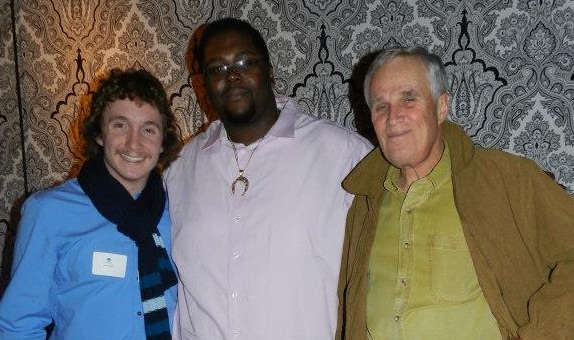“Paths They Take, Moves They Make”: A Presentation by Anthony Jack
by Megan Melloy, Program Associate (College & Alumni Programs)
 |
| College Scholar Michael "Mo" O'Connell, Anthony Jack, and Jack Schuler at the College and Alumni Scholars Winter Party |
We recently posted about Anthony Jack’s presentation to our
college and alumni scholars at the Winter Party. We asked
Anthony to speak at this event because his personal experiences are similar to
those of many Schuler Scholars. Originally from Miami, Florida, Anthony is the
son of a school monitor and is a first-generation college student. He studied
Women’s and Gender Studies and Religion at Amherst College where he graduated cum laude in 2007. Currently a Harvard Ph.D. candidate in Sociology, Anthony is generally interested in race,
culture, urban poverty, and education. His research at Harvard explores
diversity in higher education with particular interest in the college
experiences of first-generation college students at elite colleges after the
enactment of more expansive, class-based affirmative action. As a college access
program, we were excited for him to join us and share his personal experience
and his research, both of which are so relevant to the work we do.
In his presentation to the scholars, Anthony covered his
personal experiences before and at Amherst, with a focus on identifying
strengths and specific skills one acquires through overcoming adversity. Before
speaking at the Winter Party, Anthony met with Schuler Scholar Program staff
members to discuss his findings and implications for our program. His presentation
to our staff, entitled “Paths They Take, Moves They Make,” covered his research
at Harvard. This research explores why individuals from equally disadvantaged
class backgrounds and similarly impoverished neighborhoods experience the same
college so differently. The majority of students who participated in his
research participated in programs that give first-generation students
accelerated access to cultural capital that they need in order to be successful
in college. Some of the students Anthony interviewed participated in pipeline
(extraction) programs like Prep for Prep while others participated in
enrichment (non-extraction) programs like the Schuler Scholar Program.
One key hypothesis from Anthony’s research is that students
who are permitted greater access to dominant forms of cultural and social
capital before college experience the culture shock of entering college to a
lesser degree. The extent of
exposure—whether it be arts participation or total immersion via relocation—influence
the degree of culture shock felt on the college campus. While the specific
results of this variation in exposure vary for individual students, we’d like
to look at the implications of Anthony’s research for our program because the
type of programming we offer that focuses on development of cultural capital
can be more targeted to the college experience.
Because we are situated in our Scholars’ neighborhood high
schools, we focus on supplementing their home and school experiences with programming
that exposes them to the culture they will experience at highly selective
private colleges and universities. We know giving scholars the tools to
navigate the dominant culture will help them when they get to college, but we
are also beginning to see that empowering our scholars to recognize their own resourcefulness
and resiliency will equip them to succeed uniquely on their college campuses
and beyond. Anthony’s presentation helped to drive this point home, especially
with regards to our Transitions to College program for high school seniors. He
advised that we focus on mitigating culture shock, negotiating relationships at
home, and helping scholars find mentors and institutional resources on their
campuses. We aim to continually incorporate these tenets into our programming
while acknowledging the strengths that our scholars bring to any table at which
they sit, whether it is in their homes, their high schools, their colleges, or
beyond.


Comments
Post a Comment